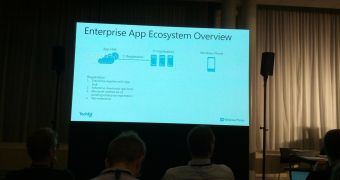Windows Phone 8 will land on shelves with over 100,000 applications already available for its users, Microsoft has long touting.
This is exactly what Alan Meeus, senior technical product manager, Windows Phone Division, Microsoft, reiterated during a Windows Phone 8 session at TechEd EMEA 2012 in Amsterdam.
However, he also took his time to discuss a bit more about the opportunities that Windows Phone 8 will open to enterprises, and to offer a glimpse at what app distribution and management will mean for them.
Windows Phone 8, the same as its predecessors, would arrive with support for great enterprise applications, Meeus said, adding that companies would have to register with Microsoft to have their software delivered to employees' phones.
The Redmond-based company already made available for download a series of tools to help IT departments within companies to get started with the development of applications for their users.
The process of pushing apps to the app store is rather simple. IT departments need to register with Microsoft for that, then they will be vetted and will be provided with certification to be able to sign their applications.
The registration process is yearly, but the fees are in line with those for other developers, Meeus also explained.
With their signing tools, certificate and specific enterprise ID, companies can then design apps, package them, submit them to the app catalog, and create tokens to push to the devices they want their apps loaded on.
One other thing that enterprises need to do is to create their own application portals, since their apps won't make it to the Windows Phone Marketplace, as they did before.
Meeus also noted that companies would be fully responsible for the experience that their applications will be able to offer to their users, as well as for the management of their applications.
One thing that is specific to Windows Phone 8 is the sandboxing of applications, which means that enterprises won't have their apps communicating to one another.
However, they can connect their software through a server back-end. They will also have the means to put different tokens on different devices, so as to target them only with specific applications.
One device can also receive applications from multiple companies, as long as it has the necessary tokens installed on it. Enterprises would also be able to push one application to their enrolled devices, Meeus also said.

 14 DAY TRIAL //
14 DAY TRIAL // 


